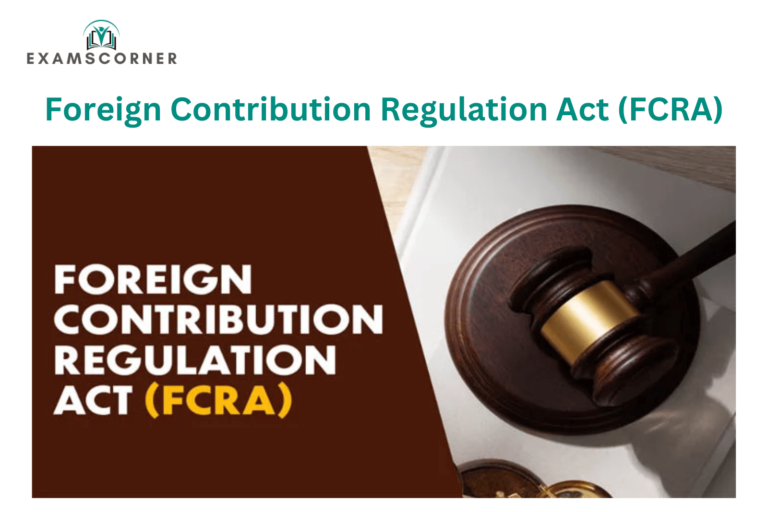The Foreign Contribution Regulation Act (FCRA) is a significant piece of legislation in India aimed at regulating the acceptance and utilization of foreign contributions or donations by individuals, associations, and organizations. Enacted in 1976 and amended in 2010, the FCRA is designed to ensure that foreign funds do not compromise national security, political interests, or the integrity of public institutions.
Objectives of the FCRA
The primary objectives of the FCRA are:
- To regulate the receipt and utilization of foreign funds by entities in India.
- To prevent activities that could negatively impact national security or political stability.
- To promote transparency and accountability in the use of foreign donations for developmental, cultural, or charitable purposes.
Key Features of the FCRA
- Eligibility for Registration:
Organizations seeking foreign funding must be registered under the FCRA and have a track record of consistent performance in their respective fields for at least three years. - Renewal of Registration:
The registration is valid for five years and must be renewed periodically. - Designated Bank Account:
Entities receiving foreign contributions must open a designated bank account in a specific branch of the State Bank of India, New Delhi, for receiving funds. - Prohibited Activities:
The FCRA prohibits foreign contributions for activities that could influence electoral politics, public servants, or judicial independence. It also restricts funding for activities that may be detrimental to national interest. - Utilization and Reporting:
Entities must ensure that funds are used only for the stated purposes. Detailed annual returns must be filed to account for the usage of foreign contributions.
Recent Amendments to the FCRA
The FCRA was amended in 2020 to introduce stricter regulations, aiming to increase transparency and accountability. Key changes include:
- Reduction in Administrative Expenses: Organizations are now allowed to spend only 20% of foreign funds on administrative expenses, down from the previous 50%.
- Ban on Sub-Granting: Entities receiving foreign contributions can no longer transfer funds to other organizations or individuals.
- Mandatory Aadhaar for Office Bearers: Office bearers of NGOs must provide Aadhaar details for identity verification.
- More Stringent Oversight: The government has enhanced its powers to monitor and suspend FCRA registrations for violations.
Impact of FCRA Regulations
- Positive Impact:
- Enhances accountability and ensures funds are used for genuine purposes.
- Prevents misuse of foreign funds for activities that could harm national security.
- Challenges and Criticism:
- Stringent provisions can disrupt the functioning of NGOs and charitable organizations.
- Administrative burdens and compliance requirements can hinder smaller organizations.
- The ban on sub-granting has limited collaboration between NGOs, affecting grassroots-level initiatives.
Significance of the FCRA
The FCRA plays a crucial role in balancing foreign funding with national interests. It ensures that foreign contributions are used for legitimate developmental purposes without compromising India’s sovereignty or internal affairs. At the same time, it promotes financial discipline and transparency among organizations receiving such funds.
Conclusion
The Foreign Contribution Regulation Act is a cornerstone of India’s regulatory framework for foreign donations. While it has strengthened oversight, there is a need to ensure that its provisions do not stifle legitimate charitable and developmental activities. A balanced approach can enable NGOs and civil society organizations to contribute effectively to nation-building while safeguarding the country’s interests.



